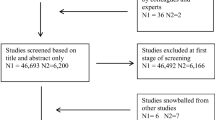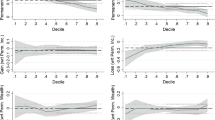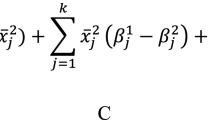Abstract.
The paper examines income distributions of a finite population consisting of households which may differ with respect to needs. Since observed incomes are not directly comparable, income distributions have to be adjusted. Incomes are transformed to equivalent incomes interpreted as living standards and measured for a reference type, and the latter are supplemented by weights depending on needs. A general class of social welfare orderings (being based on adjusted rank-ordered income distributions) is characterized by a set of properties. Severe limitations for the form of the adjustment process are implied. The consequences for the measurement of inequality and poverty are demonstrated, and corresponding orderings are derived.
Similar content being viewed by others
Author information
Authors and Affiliations
Corresponding author
Rights and permissions
About this article
Cite this article
Ebert, U. Social welfare, inequality, and poverty when needs differ. Soc Choice Welfare 23, 415–448 (2004). https://doi.org/10.1007/s00355-003-0266-2
Received:
Accepted:
Issue Date:
DOI: https://doi.org/10.1007/s00355-003-0266-2




